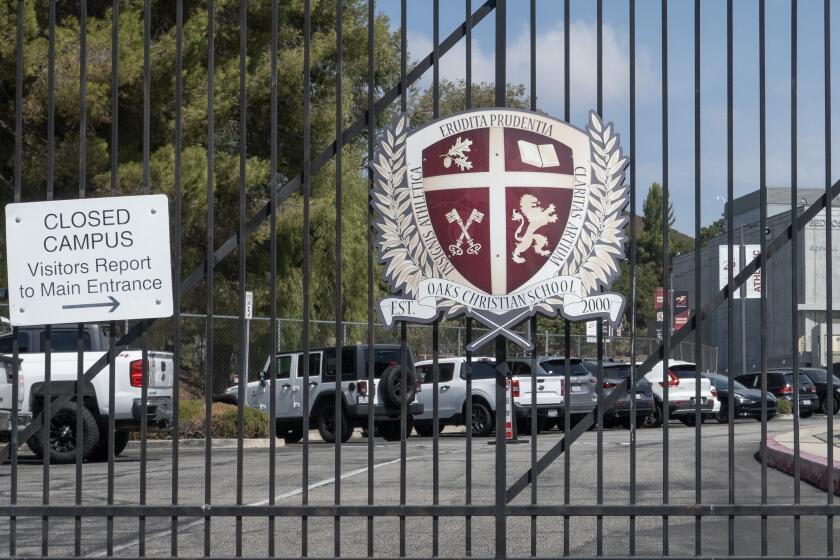Latin in Uphill Battle to Stay in British Curriculum
Latin, once sine qua non in British education, is fighting an uphill battle to stay in the curriculum.
Time was when an ability to translate Caesar’s commentaries on the Gallic War went hand in hand with running an empire, and sine qua non still sounds smoother than “indispensable condition.” But today you can get into Oxford or Cambridge without knowing your amabo from your amabis, just as Americans can get into Yale or Harvard without knowing amo, amas and amat.
In the 15 years since the ancient Roman tongue ceased to be a compulsory subject to earn a high school diploma in Britain, the number of Latin students has fallen sharply, and ancient Greek has all but vanished.
The debate resurfaced in March when it came out that in London, which has 300,000 high school students, the number choosing to study Latin for their diplomas was down from 877 in 1976 to just 286 last year. This year, only 30 of London’s 146 high schools are offering Latin.
‘Dying Language’
“Latin is a dying language in Britain’s schools,” lamented the Times of London. “It seems that it is only a matter of time before Latin vanishes altogether.”
The issue goes beyond linguistics to the perennial debate over whether the preoccupation with the classics is Britain’s problem or its salvation.
To those who say the classical heritage is Britain’s virtue, critics reply that Latin and Greek for too long eclipsed the sciences, leaving Britain at a technological disadvantage.
To those who say that a living language like German is more useful than a dead one like Latin in this pan-European age, critics respond that the modern tongues cannot be fully mastered without a grounding in Latin.
Times on the Attack
The Times concentrated its fire on the Inner London Education Authority, claiming that its elected left-wing bosses identified Latin with “elitism, imperialism, divisiveness, short hair, school uniform and the academic aspirations of the white middle class.”
Not so, responded ILEA leader Frances Morrell in a letter to the Times. Writing in Latin to drive home her point, she wrote: Tum in nos contumeliam magnam iacis-- “You do us a mighty insult.”
The London authority says it is one of the few actively trying to keep Latin studies alive, and the only one that employs a full-time classics inspector.
But Morrell was quoted as saying that Latin “had too prominent a place in the curriculum. After all, living languages have got to take precedence over dead ones,”
Indeed, letters responding to the Times’ broadside indicated that Latin’s death or survival had little to do with class. A headmaster in Brixton, one of London’s poorest inner districts, wrote to extol his school’s Latin course, while headmasters in the affluent county of Hampshire reported that Latin studies in their patch had all but vanished.
Latin has always generated strong feelings.
Columnist Anne Smith says the mental discipline imposed by learning Latin still serves her well.
“Had it not been for the patient construction and analysis learned in the Latin room, I’d never have been able to fix my mother’s washing machine as I did,” she wrote recently in the Scotsman newspaper.
Nightmare Class
But most generations remember Latin classes as a nightmare of translating phrases from ancient texts and conjugating verbs under the beady eyes of robed, cane-wielding teachers.
No Latin primer was ever complete without this time-honored ditty scribbled on its flyleaf:
“Latin is a language as dead as dead can be. It killed the ancient Romans and now it’s killing me.”
Today’s defenders of Latin blame its unpopularity on bad teaching.
“It became unfashionable to study Latin because parents would tell their children, ‘Oh you don’t want to study Latin. I did and I hated it,’ ” Belinda Dennis, a teacher and member of the Assn. for the Reform of Latin Teaching, said in an interview.
Some Latin-lovers have gone as far as to translate pop songs into Latin to attract their pupils’ interest.
The Rev. Nicholas Dunn of Prior School in Shrewsbury won fleeting fame in 1967 by rendering “These Boots Are Made for Walking” into the ancient tongue. He’s still at it, at age 75, singing his Latin translation of “Doing the Lambeth Walk” over the phone to a reporter.
But it looks like a losing battle. Latin is even dying out in the Vatican. While the Holy See still issues major documents in Latin, many senior churchmen, including some cardinals, can’t read it. The Vatican tries to update it with Latin renditions of modern expressions, but ‘violenta aeronavigii abducdio is a clumsy substitute for “skyjacking.”
Dennis said that Latin is needed to help students master technical terms, prepare to study European languages, improve spelling and grammar and learn the origins of Western culture.
In Britain, the old teaching methods have been abandoned for an approach that stresses Latin’s links with English and its everyday use in Roman times.
Many Latin teachers look to the United States for inspiration, speaking enviously of Philadelphia’s pioneering work in using Latin as a bridge to literacy in deprived inner-city schools.
Students Enjoy Latin
Dr. Rudolph Masciantonio, director of foreign-language studies for the Philadelphia School District, said that knowing the Latin word manus (hand) helps pupils tackle difficult English derivatives like manuscript, manipulate, manufacture.
“They absorb it like a sponge and enjoy it tremendously,” he said in a telephone interview.
“Accurate and discriminating language is part of the defense of our civilization, and Latin does it as none other can,” John Rae, former headmaster of London’s elite Westminster School, said.
But in an interview he admitted that Latin’s future is bleak:
“If it’s a choice in a crowded syllabus between teaching Latin or Spanish, I’d say get on with teaching Spanish. It’s more important.”
More to Read
Sign up for Essential California
The most important California stories and recommendations in your inbox every morning.
You may occasionally receive promotional content from the Los Angeles Times.









